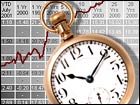
NEW YORK (CNN/Money) - Back in 2000, health-care funds were like the Hollywood "it" girl. They owned the sexiest stocks and they made money hand over fist.
The average health-care fund earned 56 percent that year, a time when most types of stock funds were off 30 percent.
Then the funds fell out of the limelight fast and hard. In 2001, they hit steep lows before settling with losses around 13 percent. And this year, they lost 9.8 percent by the end of February, falling behind the S&P 500 by more than six percentage points.
But now, the funds are showing signs of life. The 66 health-care funds tracked by Morningstar earned an average of 1.7 percent in the five days ending March 15. One fund, Fidelity Select Medical Delivery, jumped as much as 4.6 percent in that time. The S&P 500 Health Care Index is up 2.8 percent in March alone.
Those numbers might not sound like much, but it's a big move for a fund in just a handful of trading sessions -- especially when the fund has been on a downward spiral.
Still, don't plan on buying just any health-care fund and waiting for the money to roll in -- it's more complicated than that. Food and Drug Administration decisions play a big part in determining the winners and losers, and they're impossible to predict. So do reports about new drugs. On Wednesday, shares of Bristol-Myers Squibb (BMY: Research, Estimates) tumbled 15 percent to around $41 in early trading on news that its heart drug wasn't superior to Merck's.
It also hasn't been a typical recession, so it probably won't be a typical recovery, either.
A place to hide in bad times
Health care has traditionally been a defensive play during recession. Investors buy health-care stocks when times are tough on the theory that even in difficult times, people still need hospitals and medicines. When the recession ends, investors switch to stocks that get a boost from a revived economy.
Some drug stocks, such as Johnson & Johnson (JNJ: Research, Estimates), Abbott Laboratories (ABT: Research, Estimates) and Baxter International (BAX: Research, Estimates), delivered their best results in 30 years between March 2000 and September 2001, said David Lothson, managing director at UBS Warburg. The three companies doubled the overall performance of the S&P 500 in that time.
| |
 TOP HEALTH-CARE FUNDS THIS YEAR
TOP HEALTH-CARE FUNDS THIS YEAR
| |
| | |
| Source: Morningstar (Data as of 3/18)
|
|
| | |
|
Medical-devices companies also have had their day in the sun. For example, Stryker (SYK: Research, Estimates), a medical-device maker, and Zimmer (ZMH: Research, Estimates), a producer of orthopedic products, are trading near their 52-week highs.
But the rush-to-safety theory hasn't always played out, because investors haven't been swooning over certain stocks. Merck (MRK: Research, Estimates), for example, has struggled. On Friday, it fell 5 percent after plans for an arthritis drug stalled.
"It's been hit or miss -- more driven by the fundamentals of a company," said Greg Simpson, an analyst at AG Edwards.
Stocks with potential
In spite of terrible numbers earlier this year -- the S&P Health Care Index lost 4.8 percent in the first two months before starting to climb -- bulls insist the sector is on the verge of a rebound.
Sam Isaly, manager of Eaton Vance Worldwide Health Sciences, admits he was surprised the stocks fell earlier this year. At the same time, he's "totally convinced" the sector is turning around. The fund gained 2 percent last week, and is down 4.8 percent year to date as of Monday, according to Morningstar.
| |
 RELATED STORIES
RELATED STORIES
| |
| | |
| | |
|
"By the second half of April through the end of May, we will see higher earnings," Isaly said. "I think stocks will be dramatically higher."
One of the fund's holdings, Gilead Sciences (GILD: Research, Estimates), a maker of a new AIDS drug gaining wide acceptance, is up 6.7 percent in the past seven trading sessions, and up 25.4 percent year to date.
Another top name, Swiss biotech Serono, spiked up 15 percent this year after the Food and Drug Administration approved its drug for multiple sclerosis. The FDA decision ended Biogen's monopoly in the treatment.
"We don't own Merck, and part of this contest is not owning the bad ones," Isaly said.
But some managers see a long-term gem in battered Merck. Managers like star value stock picker Bill Nygren has been eyeing shares for Oakmark Fund. (Click here for more on why some managers have their sights on Merck.) Oakmark is up 5.5 percent this year, according to Morningstar.
Other strong-performing funds are JP Morgan Global Healthcare, up 1 percent for the week and 8.42 percent year to date; and Vanguard Health Care, up 2.26 percent for the week and 3.25 percent year to date, according to Morningstar.
Lothson, too, sees room to grow in some of the cheaper health-care stocks. CR Bard (BCR: Research, Estimates), a maker of health-care products, is rising after its merger plans with Tyco fell through, he said. The stock had traded as high as $64 a share but fell to $44 during merger talks. Now, the stock is trading around $57. He also likes Boston Scientific (BSX: Research, Estimates), a broadly diversified manufacturer of medical devices.

|

